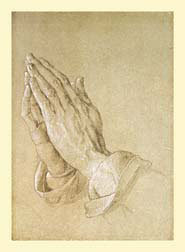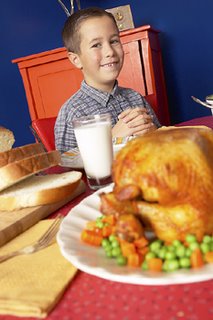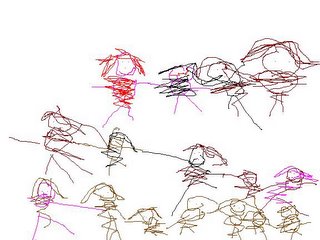
MULTICULTURAL CHAOS & EMOTIONAL INTELLIGENCE AT THANKSGIVING
There we were, newly married, living thousands of miles from either of our homes, in Durham, NC where he was in medical school. My husband was from Texas, and I was from the North Shore of Chicago. We came from two different cultures ourselves, and now were together in a new one. It turned out to be culture shock on top of culture shock as we adjusted to each other, and to the cosmopolitan student body at Duke Medical School.
CULTURE IS LEARNED
Culture is something we learn. It isn’t related to race or ethnicity, religion or anything else, but it pulls from all those groups, and, especially if we’ve only lived in one place, moved only in one social group, and/or haven’t been exposed to other cultures, we tend to think of our own culture as sacred. However, so does the other person!
As we move into an exciting new world of global interaction, there are going to be culture clashes. Let’s continue looking at this through my Thanksgiving Tale.
THE PLAYERS
The first Thanksgiving came around and friends from New England invited us over along with 6 other couples. Guests included a man from the Dominican Republic married to a woman from Spain; a couple from Missouri; a New York man married to a woman from Brazil; two French Canadians from Quebec; and two Australians who were not medical students, but neighborhood friends. Religions represented were Protestant, Catholic and Jewish. And, I should add, it included men and women.
As friends do, we all talked among ourselves both before the event, during and after. A lot of it had to do with figuring out what was going on with all these nationalities represented. We split into factions about what was “right” and what was “wrong,” often changing sides with different issues.
TIME & COMMUNICATION
“Why noon?” my husband asked. “When are we eating?” My husband liked everything organized with no surprises. I was more flexible, but willing to dive in and explore, so I called the hostess. “It’s buffet,” she said. I fished around for more information, like when were we expected to leave, and could I bring anything, hoping she’d reveal the menu. Her answers were typically New England, short and terse.
“You didn’t find out anything?” my husband asked, when I returned empty-handed.
“She didn’t volunteer anything,” I said. “I did the best I could.”
“Why didn’t you just ask her the questions outright?” he said.
“Because that’s rude,” I said.
“You’re too polite,” he replied.
“Then next time you call,” I said.
“That’s the woman’s job,” he replied.
We and the Missourians arrived at noon:11, which was our cultural dictate; a few minutes late to allow the host and hostess to make last minute adjustments, but no more than 15 minutes late. The French Canadians and the Australians arrived about 30 minutes later. The couples that included a Latino arrived an hour or two after noon.
“How rude,” said the New Yorker. “How are we supposed to be able to plan? What do you do when you invite the Gonzalezes over?”
“Relax,” said the Australians. “We’ve all got kids. Things happen.”
The French Canadians spoke to each other in French, obviously disliking tardiness, then smiled and told us, “Isn’t this a wonderful Thanksgiving,” avoiding dissension.
The Latinos didn’t appear to notice their wandering in was anything out of the ordinary They were busy hugging everyone and having a good time!
How we treat time varies greatly among cultures. We had had our cocktail hour by the time the Latinos arrived, and were ready to eat, but felt they should have time for a drink and some chatting also. It was an awkward moment. Somewhere also there was a football game involved, the timing of which got messed up.
“Don’t worry about the football game,” said the Dominican. “This is Thanksgiving.”
”Thanksgiving IS the football game,” my husband said to me, soto voce, angry over that and also because he hadn’t had any food.
THE ATTIRE
Everyone from the medical school contingent was dressed up, and in festive apparel. The Australians were in blue jeans. The social group also has a pull.
FOOD
At last we were invited to the buffet table. To me, it’s a big part of the event, and I was aghast. Boiled onions in a cream sauce, a turnip casserole, a ham, tart cranberries just crushed and sitting in a bowl … where was the turkey, the stuffing, the sweet cranberry jelly? I don’t even remember what the dessert was, but it’s for sure it wasn’t the Ambrosia my Texas-mother fixed, or the Mince Meat pie my British-ancestored father demanded.
A conversation ensued about who has what for Thanksgiving, some of us trying to convince the non-American participants of what Thanksgiving was “really” like, i.e., not like this, but also not agreeing among ourselves.
My husband and I went home feeling we hadn’t had a Thanksgiving. I didn’t get the meal, he didn’t get the football game.
THE GRACE
Approaching the table, someone suggested a prayer of Thanksgiving. The host (the highest status male present) looked surprise so we all turned toward the most known-religious man in the room. However, the host evidently decided it was his job, and began a grace. I looked around. Some had their heads bowed in prayer; others were looking around the room, ill-at-ease.
AMBIANCE
When they first walked into the house, the US participants looked around as if something was missing. What was missing? There were no Thanksgiving decorations. Nor was there a host; the hosts’ child opened the door and we went hunting for the couple.
“I miss my dad,” the Missouri woman told me, an oblique reference to the greeting-situation. “He always greeted guests so warmly, with a hug and a big smile at the front door.”
The Dominican-Spain couple missed music and dancing. “In my country we dance after dinner,” he said. “Here, you sit and fall asleep.”
He and the gentleman from Australia also stayed in the room where the women were after dinner; the rest of the guys went off to the rec room.
AFTERGLOW
Conversations continued after the event. The upshot was we’d had a good time, good company, and didn’t wish to appear ungrateful, but we all were left feeling “homesick.” Next year we’d do our own Thanksgivings, we agreed.
However, the next year my husband and I found ourselves in the car Thanksgiving Day, on the way over to the house of a Pakistani couple.
“Why on earth would they invite us over for Thanksgiving?” my husband asked. “It’s an American holiday.”
“I think it’s nice,” I said. “They’re going to live in the US and they want to join in and learn new ways. I just hope we have turkey.”
“I just better get to watch the game this year,” he added, ominously.
Over the chicken makhani and ras malai, unfortunately served during the last quarter of the football game, the Japanese woman on my right said, “So this is how you celebrate Thanksgiving here.”
CULTURAL CHAOS
Interacting with other cultures is challenging, and requires a lot of emotional intelligence. It requires flexibility, creativity, empathy and interpersonal skills, plus a lot of understanding and a sense of humor. It forces us to focus on what’s really important – the people or the details? It also brings us to a greater awareness of what our own culture is.
Emotional intelligence relies on self-awareness and then other-awareness and finding the common ground, with optimism. Global emotional intelligence relies on own-culture-awareness, then other-culture-awareness, and then finding the common ground with optimism.
========
 BUILD UP YOUR IMMUNE SYTEM FOR FLU SEASON & BIRD FLU
BUILD UP YOUR IMMUNE SYTEM FOR FLU SEASON & BIRD FLU (
DEFENSE BUILDER,
GET WELL SOON DIETARY SUPPLEMENT) ... LOSE WEIGHT BEFORE THE BIG BIRD DAY (
FIGURE 8 PRODUCTS AND "CHEWS" ...
ARBONNE HAS IT ALL.
Become an Arbonne Consultant and solve your money problems and help others at the same time. These neutraceuticals (and cosmetics and lotions) are so good they sell themselves. Anti-aging products too!
 DO WE HAVE A TREAT FOR YOU!!
DO WE HAVE A TREAT FOR YOU!!


































